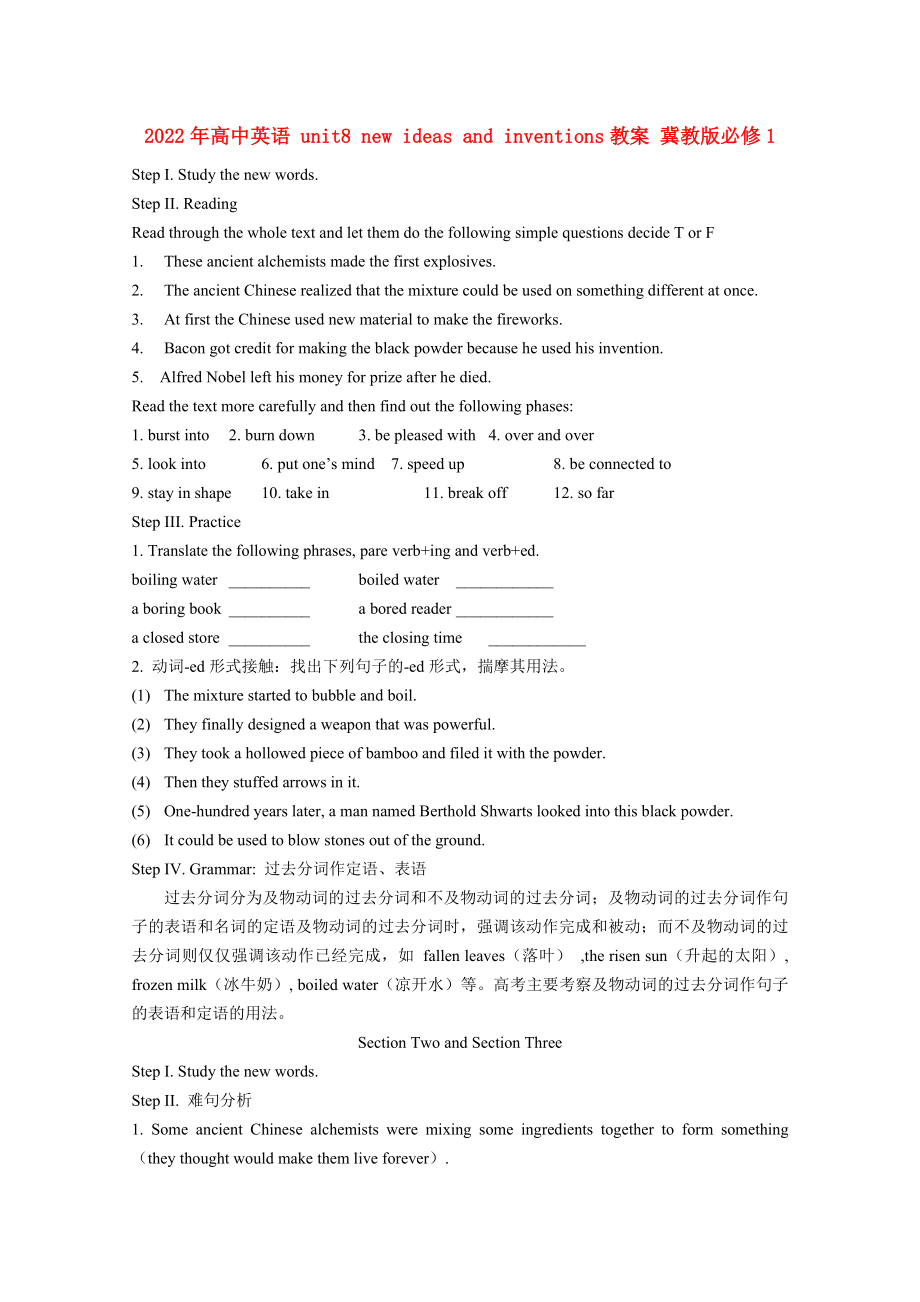《2022年高中英語(yǔ) unit8 new ideas and inventions教案 冀教版必修1》由會(huì)員分享��,可在線閱讀��,更多相關(guān)《2022年高中英語(yǔ) unit8 new ideas and inventions教案 冀教版必修1(3頁(yè)珍藏版)》請(qǐng)?jiān)谘b配圖網(wǎng)上搜索。
1��、2022年高中英語(yǔ) unit8 new ideas and inventions教案 冀教版必修1
Step I. Study the new words.
Step II. Reading
Read through the whole text and let them do the following simple questions decide T or F
1. These ancient alchemists made the first explosives.
2. The ancient Chinese realized that the mixture could
2��、be used on something different at once.
3. At first the Chinese used new material to make the fireworks.
4. Bacon got credit for making the black powder because he used his invention.
5. Alfred Nobel left his money for prize after he died.
Read the text more carefully and then find out the fol
3��、lowing phases:
1. burst into 2. burn down 3. be pleased with 4. over and over
5. look into 6. put one’s mind 7. speed up 8. be connected to
9. stay in shape 10. take in 11. break off 12. so far
Step III. Practice
1. Translate the following phrases, pare verb+ing and verb+ed.
4��、boiling water __________ boiled water ____________
a boring book __________ a bored reader ____________
a closed store __________ the closing time ____________
2. 動(dòng)詞-ed形式接觸:找出下列句子的-ed形式��,揣摩其用法��。
(1) The mixture started to bubble and boil.
(2) They finally designed a weapon that was powerful.
5��、
(3) They took a hollowed piece of bamboo and filed it with the powder.
(4) Then they stuffed arrows in it.
(5) One-hundred years later, a man named Berthold Shwarts looked into this black powder.
(6) It could be used to blow stones out of the ground.
Step IV. Grammar: 過(guò)去分詞作定語(yǔ)��、表語(yǔ)
過(guò)去分詞分為及物動(dòng)詞的過(guò)去
6��、分詞和不及物動(dòng)詞的過(guò)去分詞��;及物動(dòng)詞的過(guò)去分詞作句子的表語(yǔ)和名詞的定語(yǔ)及物動(dòng)詞的過(guò)去分詞時(shí)��,強(qiáng)調(diào)該動(dòng)作完成和被動(dòng)��;而不及物動(dòng)詞的過(guò)去分詞則僅僅強(qiáng)調(diào)該動(dòng)作已經(jīng)完成��,如 fallen leaves(落葉) ,the risen sun(升起的太陽(yáng)), frozen milk(冰牛奶), boiled water(涼開(kāi)水)等��。高考主要考察及物動(dòng)詞的過(guò)去分詞作句子的表語(yǔ)和定語(yǔ)的用法��。
Section Two and Section Three
Step I. Study the new words.
Step II. 難句分析
1. Some ancient Chinese alchemist
7��、s were mixing some ingredients together to form something(they thought would make them live forever).
(1)省略了定語(yǔ)從句引導(dǎo)詞that��。
(2)盡管that在定語(yǔ)從句中并不作賓語(yǔ)��,但是由于插入成分they thought的介入��,使得做主語(yǔ)的that帶有賓語(yǔ)的特征��。定語(yǔ)從句可還原為T(mén)hey thought the thing would make them live forever. 其中the thing由that替代��,做thought支配的賓語(yǔ)從句的主語(yǔ)��。
2. 兩個(gè)that前一個(gè)
8��、引導(dǎo)賓語(yǔ)從句��,后一個(gè)引導(dǎo)定語(yǔ)從句��。劃?rùn)M線的短語(yǔ)的句子成分是 狀語(yǔ)��,修飾動(dòng)詞realized。
Step III. Practice
1. 短語(yǔ)比較
(1) 沸水, 開(kāi)水
(2) 一本令人厭煩的書(shū), 一個(gè)煩透了的讀者��;
(3) 關(guān)門(mén)的商店, 關(guān)門(mén)時(shí)間
2. 找出下列句子的-ed形式��,指出其用法��。
(1) The mixture started to bubble and boil.
(2) They finally designed a weapon that was powerful.
(3) They took a hollowed piece of bamboo and
9��、filed it with the powder.
(4) Then they stuffed arrows in it .
(5) One-hundred years later, a man named Berthold Shwarts looked into this black powder.
(6) It could be used to blow stones out of the ground.
Step IV. Grammar: 語(yǔ)法難點(diǎn)
1. 表能力 can 和 could可與be able to 互換��。can只用于現(xiàn)在式和過(guò)去式(could); be able
10��、to可以用于各種時(shí)態(tài)��。例如:They will be able to tell you the news soon. 他很快就能告訴你消息了��。但是下列情況只用be able to:
a. 位于助動(dòng)詞后��。b. 情態(tài)動(dòng)詞后��。c. 表示過(guò)去某時(shí)刻動(dòng)作時(shí)��。 d. 用于句首表示條件��。
e. 表示成功地做了某事時(shí)��,用was/were able to,不能用could��。
例如:He was able to flee Europe before the war broke out. = He managed to flee Europe before the war broke out.他在戰(zhàn)爭(zhēng)爆發(fā)之
11��、前逃離歐洲��。
注意:could有時(shí)不表示過(guò)去時(shí)態(tài):
a.提出委婉的請(qǐng)求��,(注意在回答中不可用could)��。例如:
— Could I have the television on? 我能看電視嗎��?
— Yes, you can. / No, you can't. 可以/不可以��。
b.在否定句��、疑問(wèn)句中表示推測(cè)或懷疑��。例如:
He couldn’t be a bad man. 他不大可能是壞人��。
2. 表示請(qǐng)求��、許可 may 比較正式, can 較口語(yǔ)化,二者可通用, could還可表示較有禮貌的請(qǐng)求, might 最有禮貌��。
3. 表示推測(cè), 可能性 可用may��,can��,mu
12��、st��。may 只能用在肯定句和否定句, might的可能性要比may?�?�;can 只能用于否定句和疑問(wèn)句, could的語(yǔ)氣比can 更加不肯定,可能性更小��。 must可能性最大��,翻譯成“一定”��。may not 表示“可能不”��;can’t表示“不可能”��,語(yǔ)氣很強(qiáng)��。
4. 表示責(zé)任義務(wù)��,或提出自己的建議 “應(yīng)該”用should,ought to(語(yǔ)氣比should強(qiáng))��, “必須”用must (強(qiáng)調(diào)主觀因素)或have to (強(qiáng)調(diào)客觀因素)
Exercises:
用適當(dāng)?shù)那閼B(tài)動(dòng)詞填空
1. You _______ work harder if you want to succeed.
13��、2. ____ I have some more tea?
3. Where _____ it be? It ______ be in your desk.
4. Who _____ it be? It _______ not be the headmaster for he is now attending a meeting.
5. I ______ read English very fluently.
6. He __________ swim across the channel when was only 12.
7. It ______ rain at any moment.
8. Listen! It _____ be Mother back. Let’s hurry up.
9. —What should I do?
—I think you ________ read more books about your study.
10. It _____ not be him, but I am not sure.
 2022年高中英語(yǔ) unit8 new ideas and inventions教案 冀教版必修1
2022年高中英語(yǔ) unit8 new ideas and inventions教案 冀教版必修1

